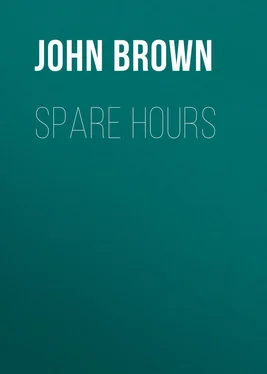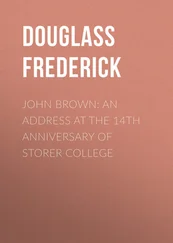John Brown - Spare Hours
Здесь есть возможность читать онлайн «John Brown - Spare Hours» — ознакомительный отрывок электронной книги совершенно бесплатно, а после прочтения отрывка купить полную версию. В некоторых случаях можно слушать аудио, скачать через торрент в формате fb2 и присутствует краткое содержание. ISBN: , Жанр: foreign_antique, foreign_prose, на английском языке. Описание произведения, (предисловие) а так же отзывы посетителей доступны на портале библиотеки ЛибКат.
- Название:Spare Hours
- Автор:
- Жанр:
- Год:неизвестен
- ISBN:http://www.gutenberg.org/ebooks/27153
- Рейтинг книги:4 / 5. Голосов: 1
-
Избранное:Добавить в избранное
- Отзывы:
-
Ваша оценка:
- 80
- 1
- 2
- 3
- 4
- 5
Spare Hours: краткое содержание, описание и аннотация
Предлагаем к чтению аннотацию, описание, краткое содержание или предисловие (зависит от того, что написал сам автор книги «Spare Hours»). Если вы не нашли необходимую информацию о книге — напишите в комментариях, мы постараемся отыскать её.
Spare Hours — читать онлайн ознакомительный отрывок
Ниже представлен текст книги, разбитый по страницам. Система сохранения места последней прочитанной страницы, позволяет с удобством читать онлайн бесплатно книгу «Spare Hours», без необходимости каждый раз заново искать на чём Вы остановились. Поставьте закладку, и сможете в любой момент перейти на страницу, на которой закончили чтение.
Интервал:
Закладка:
One fine October afternoon, I was leaving the hospital, when I saw the large gate open, and in walked Rab, with that great and easy saunter of his. He looked as if taking general possession of the place; like the Duke of Wellington entering a subdued city, satiated with victory and peace. After him came Jess, now white from age, with her cart; and in it a woman, carefully wrapped up, – the carrier leading the horse anxiously, and looking back. When he saw me, James (for his name was James Noble) made a curt and grotesque “boo,” and said, “Maister John, this is the mistress; she’s got a trouble in her breest – some kind o’ an income we’re thinking’.”
By this time I saw the woman’s face; she was sitting on a sack filled with straw, her husband’s plaid round her, and his big-coat with its large white metal buttons, over her feet.
I never saw a more unforgettable face – pale, serious, lonely , 2delicate, sweet, without being at all what we call fine. She looked sixty, and had on a mutch, white as snow, with its black ribbon; her silvery, smooth hair setting off her dark-gray eyes – eyes such as one sees only twice or thrice in a lifetime, full of suffering, full also of the overcoming of it: her eyebrows black and delicate, and her mouth firm, patient, and contented, which few mouths ever are.
As I have said, I never saw a more beautiful countenance, or one more subdued to settled quiet. “Ailie,” said James, “this is Maister John, the young doctor; Rab’s freend, ye ken. We often speak aboot you, doctor.” She smiled, and made a movement, but said nothing; and prepared to come down, putting her plaid aside and rising. Had Solomon, in all his glory, been handing down the Queen of Sheba at his palace gate, he could not have done it more daintily, more tenderly, more like a gentleman, than did James the Howgate carrier, when he lifted down Ailie his wife. The contrast of his small, swarthy, weather-beaten, keen, worldly face to hers – pale, subdued, and beautiful – was something wonderful. Rab looked on concerned and puzzled, but ready for anything that might turn up, – were it to strangle the nurse, the porter, or even me. Ailie and he seemed great friends.
“As I was sayin’ she’s got a kind o’ trouble in her breest, doctor; wull ye tak’ a look at it?” We walked into the consulting-room, all four; Rab grim and comic, willing to be happy and confidential if cause could be shown, willing also to be the reverse, on the same terms. Ailie sat down, undid her open gown and her lawn handkerchief round her neck, and without a word, showed me her right breast. I looked at and examined it carefully, – she and James watching me, and Rab eying all three. What could I say? there it was, that had once been so soft, so shapely, so white, so gracious and bountiful, so “full of all blessed conditions,” – hard as a stone, a centre of horrid pain, making that pale face, with its gray, lucid, reasonable eyes, and its sweet resolved mouth, express the full measure of suffering overcome. Why was that gentle, modest, sweet woman, clean and lovable, condemned by God to bear such a burden?
I got her away to bed. “May Rab and me bide?” said James. “ You may; and Rab, if he will behave himself.” “I’se warrant he’s do that, doctor;” and in slank the faithful beast. I wish you could have seen him. There are no such dogs now. He belonged to a lost tribe. As I have said, he was brindled and gray like Rubislaw granite; his hair short, hard, and close, like a lion’s; his body thick set, like a little bull – a sort of compressed Hercules of a dog. He must have been ninety pounds’ weight, at the least; he had a large blunt head; his muzzle black as night, his mouth blacker than any night, a tooth or two – being all he had – gleaming out of his jaws of darkness. His head was scarred with the records of old wounds, a sort of series of fields of battle all over it; one eye out, one ear cropped as close as was Archbishop Leighton’s father’s; the remaining eye had the power of two; and above it, and in constant communication with it, was a tattered rag of an ear, which was forever unfurling itself, like an old flag; and then that bud of a tail, about one inch long, if it could in any sense be said to be long, being as broad as long – the mobility, the instantaneousness of that bud were very funny and surprising, and its expressive twinklings and winkings, the intercommunications between the eye, the ear, and it, were of the oddest and swiftest.
Rab had the dignity and simplicity of great size; and having fought his way all along the road to absolute supremacy, he was as mighty in his own line as Julius Cæsar or the Duke of Wellington, and had the gravity 3of all great fighters.
You must have often observed the likeness of certain men to certain animals, and of certain dogs to men. Now, I never looked at Rab without thinking of the great Baptist preacher, Andrew Fuller. 4The same large, heavy, menacing, combative, sombre, honest countenance, the same deep inevitable eye, the same look, – as of thunder asleep, but ready, – neither a dog nor a man to be trifled with.
Next day, my master, the surgeon, examined Ailie. There was no doubt it must kill her, and soon. It could be removed – it might never return – it would give her speedy relief – she should have it done. She curtsied, looked at James, and said, “When?” “To-morrow,” said the kind surgeon – a man of few words. She and James and Rab and I retired. I noticed that he and she spoke little, but seemed to anticipate everything in each other. The following day, at noon, the students came in, hurrying up the great stair. At the first landing-place, on a small well-known blackboard, was a bit of paper fastened by wafers, and many remains of old wafers beside it. On the paper were the words, – “An operation to-day. J. B. Clerk .”
Up ran the youths, eager to secure good places: in they crowded, full of interest and talk. “What’s the case?” “Which side is it?”
Don’t think them heartless; they are neither better nor worse than you or I; they get over their professional horrors, and into their proper work – and in them pity – as an emotion , ending in itself or at best in tears and a long-drawn breath, lessens, while pity as a motive , is quickened, and gains power and purpose. It is well for poor human nature that it is so.
The operating theatre is crowded; much talk and fun, and all the cordiality and stir of youth. The surgeon with his staff of assistants is there. In comes Ailie: one look at her quiets and abates the eager students. That beautiful old woman is too much for them; they sit down, and are dumb, and gaze at her. These rough boys feel the power of her presence. She walks in quickly, but without haste; dressed in her mutch, her neckerchief, her white dimity short-gown, her black bombazine petticoat, showing her white worsted stockings and her carpet-shoes. Behind her was James with Rab. James sat down in the distance, and took that huge and noble head between his knees. Rab looked perplexed and dangerous; forever cocking his ear and dropping it as fast.
Ailie stepped up on a seat, and laid herself on the table, as her friend the surgeon told her; arranged herself, gave a rapid look at James, shut her eyes, rested herself on me, and took my hand. The operation was at once begun; it was necessarily slow; and chloroform – one of God’s best gifts to his suffering children – was then unknown. The surgeon did his work. The pale face showed its pain, but was still and silent. Rab’s soul was working within him; he saw that something strange was going on, – blood flowing from his mistress, and she suffering; his ragged ear was up, and importunate; he growled and gave now and then a sharp impatient yelp; he would have liked to have done something to that man. But James had him firm, and gave him a glower from time to time, and an intimation of a possible kick; – all the better for James, it kept his eye and his mind off Ailie.
Читать дальшеИнтервал:
Закладка:
Похожие книги на «Spare Hours»
Представляем Вашему вниманию похожие книги на «Spare Hours» списком для выбора. Мы отобрали схожую по названию и смыслу литературу в надежде предоставить читателям больше вариантов отыскать новые, интересные, ещё непрочитанные произведения.
Обсуждение, отзывы о книге «Spare Hours» и просто собственные мнения читателей. Оставьте ваши комментарии, напишите, что Вы думаете о произведении, его смысле или главных героях. Укажите что конкретно понравилось, а что нет, и почему Вы так считаете.












